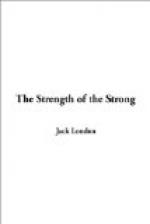And then nothing happened. The whole island was confuted. The boy grew and prospered. The schoolmaster never ceased averring that it was the brightest lad he had ever seen. Samuel had a splendid constitution, a tremendous grip on life. To everybody’s amazement he escaped the usual run of childish afflictions. Measles, whooping-cough and mumps knew him not. He was armour-clad against germs, immune to all disease. Headaches and earaches were things unknown. “Never so much oz a boil or a pumple,” as one of the old bodies told me, ever marred his healthy skin. He broke school records in scholarship and athletics, and whipped every boy of his size or years on Island McGill.
It was a triumph for Margaret Henan. This paragon was hers, and it bore the cherished name. With the one exception of her mother, friends and relatives drifted back and acknowledged that they had been mistaken; though there were old crones who still abided by their opinion and who shook their heads ominously over their cups of tea. The boy was too wonderful to last. There was no escaping the curse of the name his mother had wickedly laid upon him. The young generation joined Margaret Henan in laughing at them, but the old crones continued to shake their heads.
Other children followed. Margaret Henan’s fifth was a boy, whom she called Jamie, and in rapid succession followed three girls, Alice, Sara, and Nora, the boy Timothy, and two more girls, Florence and Katie. Katie was the last and eleventh, and Margaret Henan, at thirty-five, ceased from her exertions. She had done well by Island McGill and the Queen. Nine healthy children were hers. All prospered. It seemed her ill-luck had shot its bolt with the deaths of her first two. Nine lived, and one of them was named Samuel.
Jamie elected to follow the sea, though it was not so much a matter of election as compulsion, for the eldest sons on Island McGill remained on the land, while all other sons went to the salt-ploughing. Timothy followed Jamie, and by the time the latter had got his first command, a steamer in the Bay trade out of Cardiff, Timothy was mate of a big sailing ship. Samuel, however, did not take kindly to the soil. The farmer’s life had no attraction for him. His brothers went to sea, not out of desire, but because it was the only way for them to gain their bread; and he, who had no need to go, envied them when, returned from far voyages, they sat by the kitchen fire, and told their bold tales of the wonderlands beyond the sea-rim.
Samuel became a teacher, much to his father’s disgust, and even took extra certificates, going to Belfast for his examinations. When the old master retired, Samuel took over his school. Secretly, however, he studied navigation, and it was Margaret’s delight when he sat by the kitchen fire, and, despite their master’s tickets, tangled up his brothers in the theoretics of their profession. Tom Henan




